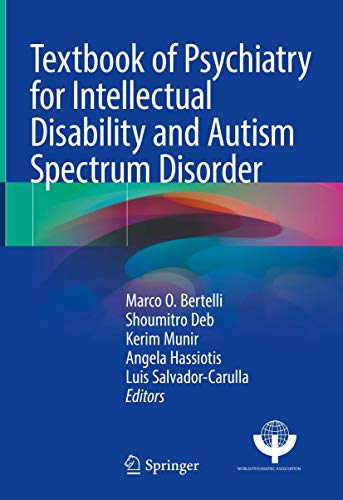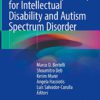Textbook of Psychiatry for Intellectual Disability and Autism Spectrum Disorder Hardcover – November 17, 2021 by Marco O. Bertelli
HARDCOVER
[705 pages]
PUB: November 17, 2021
Description
Author: Bertelli Marco O.
Brand: Springer
Edition: 1st ed. 2022
Package Dimensions: 0x254x788
Number Of Pages: 705
Release Date: 20-02-2022
Details: Product Description
This textbook provides a state of the art of the knowledge on the prevalence, risk and etiological factors, clinical features, assessment procedures and tools, diagnostic criteria, treatment, and prognosis of the psychiatric disorders encountered in people with intellectual disability (ID) and low-functioning autism spectrum disorder (ASD). ID and ASD represent two meta-syndromic groups of several different conditions, each with particular cognitive and communication features. People with ID/ASD display an increased prevalence of a variety of psychiatric disorders, including psychotic disorders, mood disorders, anxiety and stress-related disorders, somatoform disorders, and obsessive-compulsive disorder, as well behavioral syndromes, personality disorders, and disorders due to psychoactive substance use. This book will enable readers to understand the specificities of psychiatric disorders in the context of ID/ASD. It explains clearly how diagnostic criteria and assessment procedures for psychiatric disorders that were created for the general population have to be modified for use with ID/ASD. Above all, it will enable clinicians to overcome difficulties in diagnosis and to deliver more effective care that meets the particular needs of patients with ID/ASD.
From the Back Cover
This textbook provides a state of the art of the knowledge on the prevalence, risk and etiological factors, clinical features, assessment procedures and tools, diagnostic criteria, treatment, and prognosis of the psychiatric disorders encountered in people with intellectual disability (ID) and low-functioning autism spectrum disorder (ASD). ID and ASD represent two meta-syndromic groups of several different conditions, each with particular cognitive and communication features. People with ID/ASD display an increased prevalence of a variety of psychiatric disorders, including psychotic disorders, mood disorders, anxiety and stress-related disorders, somatoform disorders, and obsessive-compulsive disorder, as well behavioral syndromes, personality disorders, and disorders due to psychoactive substance use. This book will enable readers to understand the specificities of psychiatric disorders in the context of ID/ASD. It explains clearly how diagnostic criteria and assessment procedures for psychiatric disorders that were created for the general population have to be modified for use with ID/ASD. Above all, it will enable clinicians to overcome difficulties in diagnosis and to deliver more effective care that meets the particular needs of patients with ID/ASD.
About the Author
Marco O. Bertelli, MD, is the Scientific Director of the Research and Clinical Centre (CREA) of Fondazione San Sebastiano, Florence, Italy. He acted as a consultant psychiatrist to various service providers for people with intellectual disability and mental health problems. He worked as an adjunct Professor at the University of Florence, taught and still teaches in several Italian and international courses. Dr. Bertelli is the current President of SIDiN (Italian Society for Neurodevelopmental Disorders) and past president of both the Psychiatry of Intellectual Disability section of the World Psychiatric Association and the European Association for Mental Health in Intellectual Disability. He has been a member of the working group on Classification of Intellectual Disabilities of the WHO International Advisory Group for the revision of ICD-11. He is an editorial board member of some scientific journal in the field, such as the Journal of Intellectual Disability Research, and author of around 150 journal articles and book chapters. Since 2017 Dr. Bertelli is member of the scientific committee of the Italian Observatory for Disabilities. In 2011 he was appointed with the Honorary Membership of the World Psychiatric Association for excellence in service and in 2021 he received the Leon Eisenberg Award of the Harvard Medical School
Be the first to review “Textbook of Psychiatry for Intellectual Disability and Autism Spectrum Disorder Hardcover – November 17, 2021 by Marco O. Bertelli”
You must be <a href="https://webdelico.com/my-account/">logged in</a> to post a review.





























There are no reviews yet.